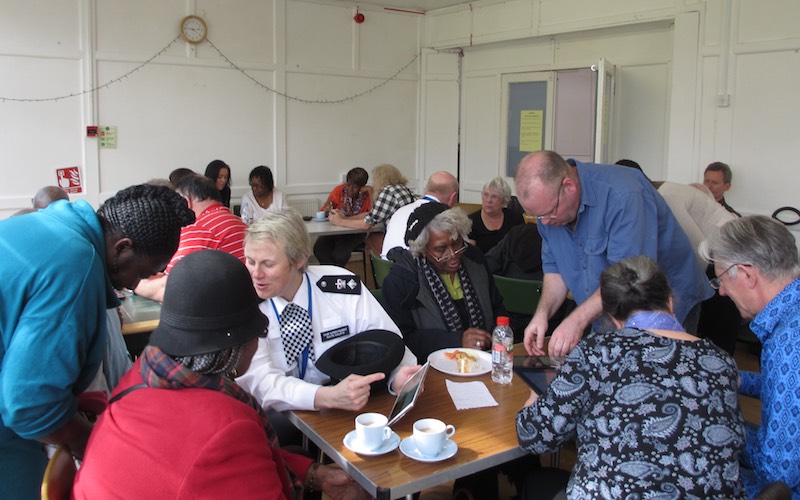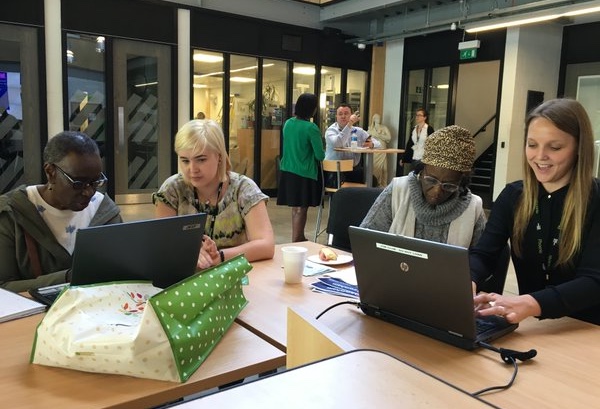Why?
From our research we know that almost a quarter of adults in the UK don’t have basic digital skills. That means they cannot do things many of us take for granted, like shopping cheaply online, keeping in touch with family, or writing their CV and sharing it with potential employers.
Many of these people are older, poorer and more disadvantaged than the rest of our society. Being offline and without basic digital skills costs people an average of £744 a year, and with more and more public services moving online, not having access to the internet or the skills to use it is a more significant problem today than ever before.
To tackle this issue, we wanted to understand how best to demonstrate the benefits of using the internet to the people and communities who are most at need.
What we did

We launched Go ON Croydon on 9 November 2015 and Go ON Lewisham on 29 February 2016. Both pilots ran for a year.
The projects were based on open partnership and collaboration, and we worked closely with the local Councils, our Principal Partners and a range of local businesses and community organisations from the public, private and not-for-profit sectors.
Many partners provided volunteer digital champions from their own staff to help residents improve their digital skills. Others provided venue space, kit and low-cost connectivity. We would like to thank them all for their help and generous support.
Doteveryone led and coordinated the projects in Croydon and Lewisham, collating and sharing what we found. We also identified and worked with a broad range of partners and supporters to build a strong foundation for longer-term projects.
Projects Digital ZonesOur approach was to ‘test and learn’. We tried three specific ways to engage with the least digitally skilled groups:
1. Digital Zones
Digital Zones were physical spaces on the premises of our partner organisations where volunteer digital champions held informal, regular drop-in sessions to help people with their digital skills. These partner-led zones were designed to engage with large numbers of people in a light-touch, friendly way, in a non-intimidating environment.
Projects Deep Dives2. Deep Dives
Deep Dives provided more structured and deeper engagement with smaller groups to identify how to motivate people with specific needs to take their first steps online. These groups included older people, the homeless and young people not in education, employment or training.
3. Community Engagement
These projects were community based and managed, with a focus on grassroots engagement. By ensuring these projects were owned by the local community, the activities will be more sustainable after the pilots have ended.
Projects Community EngagementWe evaluated the activities using a range of surveys and standardised feedback forms to track their impact. We kept in close contact with participants and held regular face-to-face and telephone meetings with partners to share information and insight.
Read more about the Digital Zones, Deep Dives and Community Engagement projects.
What we found
We've achieved many ground-breaking successes and learned valuable lessons, which we are sharing openly and honestly through this report.
- We helped to deliver a 9% and 10% rise in the number of people with basic digital skills in Croydon and Lewisham respectively
- We have helped more than 7,500 people to gain basic digital skills
- We have worked with dozens of community groups to give them a structure for reaching a wider audience to help them to take their first steps into the digital world.
But that's not all. We proved that:
- going 'hyperlocal' is the most effective way of engaging the hard to reach,
- people learn best from repeated, informal, face-to-face and one-to-one support,
- there is no 'magic formula' or model for engaging with people, and
- understanding people's motivation to learn something new is critical.

Most things we did worked well, but where we found challenges or issues, we've shared them and the reasons why we think they happened.
Read more about what worked well and less well, and about how we did the work.
What should happen next
There is an urgent need to address the UK's gap in basic digital skills and reduce the risk of becoming a two-tier society. This report shows new and effective ways of reaching people and communities through trusted local intermediaries and with local interventions to help to mitigate that risk and close the gap.
We want to influence local and national digital skills strategy to make the UK one of the most digitally skilled nations in the world, and help other UK local authorities and community groups deliver basic digital skills to those most in need. These organisations are best placed to set up local schemes that give people and communities the confidence and competence in their basic digital skills both to benefit them individually and to keep the UK's economy competitive.

Go ON Croydon completed its pilot phase at the end of November 2016 and Go ON Lewisham did so in February 2017.
Many of the corporate and community partners involved in Go ON Croydon have committed to continuing their activities. Croydon Council, alongside other partners, will start to manage and evaluate the ongoing activities and some new ones, for example with Croydon libraries.
Other UK local authorities and London boroughs have contacted us to find out about setting up similar projects to help their own residents. We’re exploring whether an ‘off-the-shelf’ toolkit, a Digital Zone in a Box, could help them to do that.